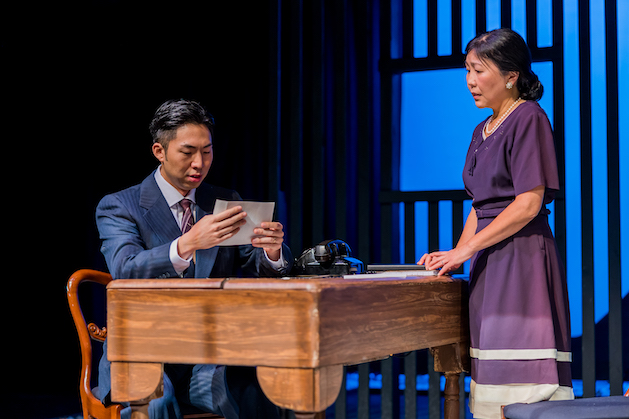
Ryota Kaneko and Manami Hara in Courage Now (Photo by Youn Park)
I was afraid that Courage Now might be ploddingly literal, but it’s a moving piece of art.
There is no doubt that more people need to know the real-life story of Chiune Sugihara, who was Japan’s vice-consul in Kaunas, Lithuania near the beginning of World War II. In 1940, Lithuanian Jews, as well as Jews fleeing German-occupied western Poland, were increasingly desperate to get out of Lithuania — and Europe. But to do so, they needed travel visas, which were virtually impossible to get. Seeing the situation for what it was, Sugihara defied repeated direct orders from Japan and started issuing travel documents on July 16, often working 20 hours a day. By August 3, when he was called back to Berlin, he had issued enough documents to allow between 4,500 and 6,000 people to travel across Russia and then to Japan. Many of those refugees arrived in Vancouver. It’s estimated that 100,000 people are alive today because of his efforts.
In doing this, Sugihara risked his life and the lives of his family. When he returned to Japan, he was fired from the diplomatic service and disgraced. In 1985, a year before his death, Israel honoured him as one of the Righteous Among the Nations.
None of these facts can be considered spoilers: they’re all in the program. And I don’t think knowing them in advance should make much difference; I knew all of this going in and I was still deeply moved by watching how it unfolds in this telling.
Audaciously, playwright Manami Hara takes a magical realist approach. The day in 1986 when a Vancouver woman named Margaret Grant arrives at the home of Chiune’s widow Yukiko in Japan, Yukiko has already been visited by Chiune’s ghost. And Margaret brings her own ghosts. She is a “Sugihara Jew”: when she was 13, Chiune helped her get out of Lithuania, but she’s haunted by questions about why her father, Jankl, didn’t come with her. (Her mother was already trapped in Poland.) Margaret hopes that Yukiko will help her to fill in the blanks in her story.
Soon, as flashbacks overlap with naturalistic scenes, everybody is seeing ghosts. It’s a resonant set-up.
I appreciated finding out more about Chiune and Yukiko’s backstory, and Margaret’s narrative of abandonment is deftly handled.
All of the performances are strong, none more than Ryota Kaneko’s Chiune. In his portrait, Kaneko combines easy charm, furious independence, and heartbreaking stoicism. For me, the most moving moment in the show comes when Chiune apologizes to a crowd of desperate Jews for not having done more sooner. (This moment is historically documented.)
Playwright Hara brings intelligence, wit, and depth of feeling to Yukiko. And the understatement of Amitai Marmorstein’s Yankel is a pleasure to behold. Advah Soudack as Margaret and Katherine Matlashewski as Shayna, Margaet’s 13-year-old self, are also responsively present.
With its deftly suggested architectural elements, including a gravel pathway, Kimira Reddy’s set is elegance itself. And director Amiel Gladstone production delivers both tonal consistency — this show is magical, yet emotionally powerful — and moments of great theatricality: there’s a visual flourish at the train station that will stay with you for a long time.
There are a couple of glitches in the matrix, moments when you wonder why Yukiko and Margaret aren’t puzzled when they each start talking to “invisible” characters, and there are one or two of passages in which the exposition gets a bit bald. But these are minor complaints.
Courage Now is the kind of show that wrecks you and makes you feel grateful for the integrity of the experience.
COURAGE NOW by Manami Hara. Directed by Amiel Gladstone. A Firehall Arts Centre production at the Firehall on Friday, November 25. Continues until December 4. Tickets and information
NEVER MISS A REVIEW: Sign up for FRESH SHEET, my weekly e-letter about the arts.
And, if you want to help to keep independent arts criticism alive in Vancouver, check out my Patreon page.





0 Comments